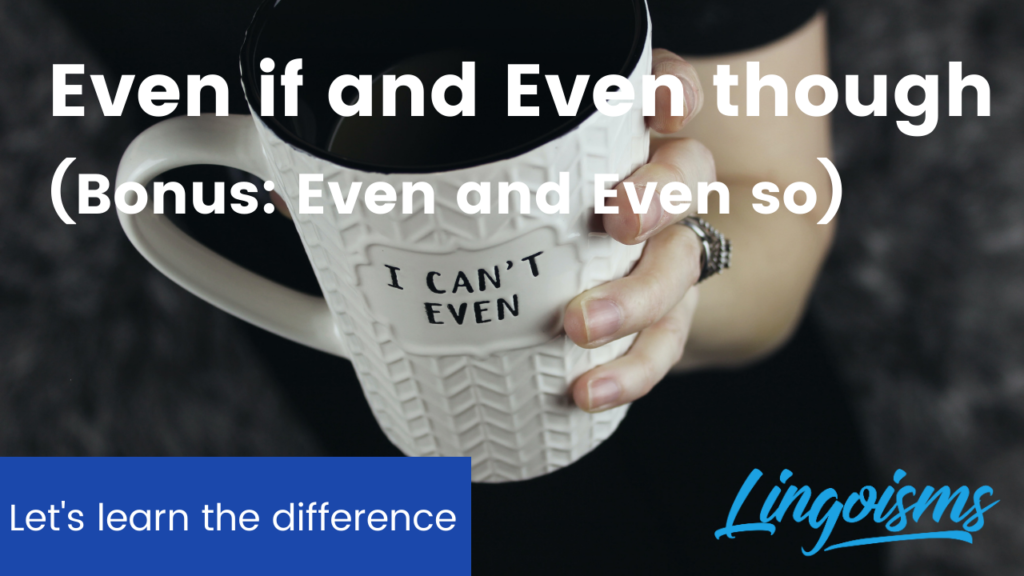Even, even if, even though, and even so frequently get misused or used to mean the same thing in the English
language. However, they are quite different and sometimes have a opposite meaning so it’s important to get these right.
Let’s start with the two that get most often confused; even if and even though.
Even if
“Even if” is a conjunction. A conjunction connects two sentences or clauses or thoughts. “Even if” is used to describe something that is unreal or imaginary. You can also describe “even if” as meaning “whether or not”. Let’s look at some examples…
“Even if I become a millionaire, I will always lead a simple life.”
In this sentence, we are not a millionaire now, so saying “even if I become a millionaire” is an imaginary statement. Also when using “even if” in this sentence, you mean that whether or not you become a millionaire, you will have a simple lifestyle.

“I’m going out tomorrow, even if it’s raining.”
In this sentence, “even if” means that whether or not it is raining, the person is going to go out.
Even though
“Even though” is used in a sentence when talking about a real situation. Even though can be used to mean “despite that fact that.” “Even though” is also a conjunction, just like “even if”. Let’s look at the same examples we used before but substitute in even though.
“Even though I became a millionaire, I still lead a simple life.”
In this sentence, even though gets used to show that despite that the person is a millionaire now (fact), they still choose to keep a simple lifestyle.

“I’m going out tonight, even though it is raining.”
In this sentence, even though gets used because the speaker is saying that despite the fact that it is currently raining, they are going out.
For both of these examples, you can see that the meaning of the sentence changed from the situation being a possibility, meaning it might happen, to a reality, meaning it is or did happen.
Even
Even is an adverb. An adverb is used to describe a verb, and adjective, or another adverb. It is used when you are talking about something that is surprising or extreme or if it is something that you did not expect.
“They even served champagne at breakfast.”
In this sentence, even is describing the verb, or action, “served”. Normally you would not get champagne with breakfast, so this is surprising and unexpected.

Even So
“Even so” is actually quite similar to “even though.” However, “even so” is used at the beginning of a main clause either a the start of a sentence or after “but.” Even so gets used after a fact is stated but something is done in spite of that fact. This means that the statement following “even so” may be the opposite of the fact given. For example…
“I know her English isn’t very good, but even so I can understand her.”
The fact given is that her English is not good. However, the speaker can understand her in spite of this fact. (You could also say…”Even though her English isn’t good, I can still understand her.” Both sentences mean the same thing, just the grammar is different with “even though” and “even so.”
“The weather wasn’t great. Even so, we enjoyed our trip.”
The fact given in the sentence is that the weather was bad. However, they still had a good time in spite of the weather.
Here you could also say…”We enjoyed our trip even though the weather wasn’t great.”

Let’s Review
When you are speaking or writing and trying to figure out which phrase to use between even, even if, even though, and even so, think about the meaning of the sentence you are forming.
Use the term “even” by itself when describing something that is surprising.
Use the term “even if” when you are talking about something that is unreal or an imaginary situation or event. A
situation or event that may or may not occur.
Use the term “even though” when talking about a real situation. You can also think of using this term to mean ‘despite the fact that…’
Use the term “even so” to mean in spite of a fact. Think of using even so to mean the opposite of the fact that is given.
Let's test your knowledge (answers below)
- I’m going to study tonight _____ I’m really tired. (even if / even though / even / even so)
- I want to travel everywhere _____ the moon. (even if / even though / even / even so)
- _______ you were taller, you still couldn’t play basketball in the NBA. (even if / even though / even / even so)
- Canada is a huge country, but ______ it has a small population.
- I will pass the test ______ I have to study for 2 days straight. (even if / even though / even / even so)
- ______ he is my best friend I wouldn’t want to live with him. (even if / even though / even / even so)
- The food was so delicious. _____ is was so cheap. (even if / even though / even / even so)
- Their house is amazing. It _____ has a swimming pool with a waterfall. (even if / even though / even / even so)
Well, I hope this lesson helped you understand “even, even if, even though and even so” more.
As always, thanks for reading.
Improving your English involves taking action. It also helps you remember. So try writing some example sentences, type them in the comment box below to get some practice.

